
Mecodema is a genus of large flightless ground beetle (Carabidae) endemic to New Zealand. The genus is very diverse in comparison to the other three New Zealand genera within the subtribe Nothobroscina. Mecodema is geographically widespread across both the North and South Islands, as well as numerous offshore islands, including the Three Kings Is., Poor Knights Is., Aotea and Hauturu, Kapiti Is., Stephens Is., Stewart Is., Chatham Is., Snares Is.

Hadramphus, commonly known as knobbled weevils, is a genus of flightless molytine weevils from the family Curculionidae. It is endemic to New Zealand and consists of four species.

Chaetosomatidae is a small family of beetles, in the superfamily Cleroidea. There are three extant genera, two of which are endemic to New Zealand with the other (Malgassochaetus) native to Madagascar. Members of this family are predaceous on wood-boring insects.
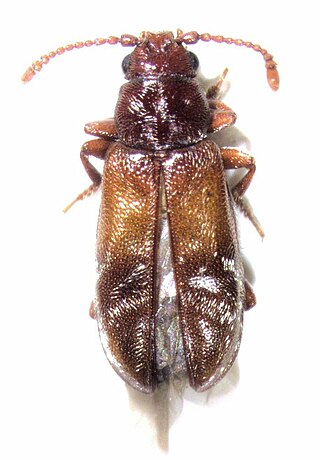
Cavognathidae is a family of beetles, in the superfamily Cucujoidea. It contains a single genus, Taphropiestes with around a dozen species known from South America, Australia and New Zealand. In Australian and New Zealand species adults and larvae have been found living in bird nests, but their ecology is unclear, but they are possibly scavengers.
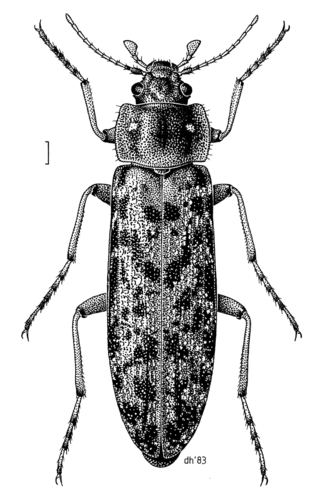
The Chalcodryidae are a family of beetles in the superfamily Tenebrionoidea. It contains at least five species in two genera Chalcodrya and Philpottia, which are endemic to New Zealand. They are generally found associated with moss or lichen covered branches, with the larvae having been found to be associated with dead twigs. They are likely noctural, feeding on lichen and other plant material at night. The genera Sirrhas and Onysius, formerly placed in this family, have subsequently been transferred to Promecheilidae.
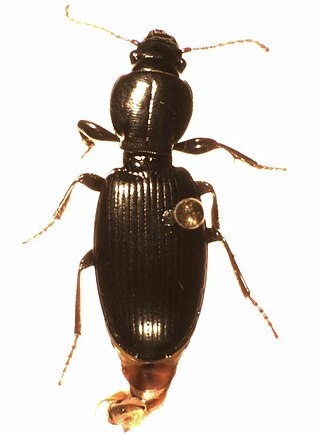
Diglymma is a genus in the beetle family Carabidae. There are about five described species in Diglymma, found in New Zealand.
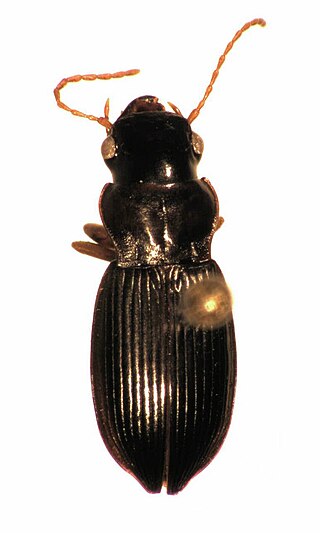
Allocinopus is a genus of beetles in the family Carabidae, containing the following species:

Gaioxenus is a genus of beetles in the family Carabidae. Gaioxenus pilipalpis is the only species in the genus. This genus and species was first described by Thomas Broun in 1910. Broun based the descriptions on specimens he collected in Raurimu in the Manawatū-Whanganui region of New Zealand. Gaioxenus pilipalpis is endemic to New Zealand.

Taenarthrus is a genus of ground beetles in the family Carabidae. There are about 13 described species in Taenarthrus, found in New Zealand.

Thomas Broun was a Scottish-born soldier, farmer, teacher and entomologist, who spent much of his career in New Zealand. He is known for his study of the beetles (Coleoptera) of New Zealand.
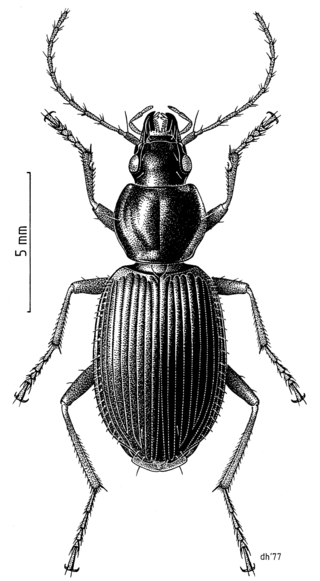
Ctenognathus is a genus of beetles in the family Carabidae. This genus is endemic to New Zealand. It was first described by Léon Fairmaire in 1843.

Holcaspis is a genus of beetles in the family Carabidae, endemic to New Zealand.

Megadromus is a genus in the beetle family Carabidae. There are at least 30 described species in Megadromus, found in New Zealand.

Oopterus is a genus in the beetle family Carabidae. There are more than 20 described species in Oopterus, found in New Zealand.

Somatidia is a genus of longhorn beetles of the subfamily Lamiinae, containing the following species:

Hybolasius is a genus of longhorn beetles of the subfamily Lamiinae, containing the following species:
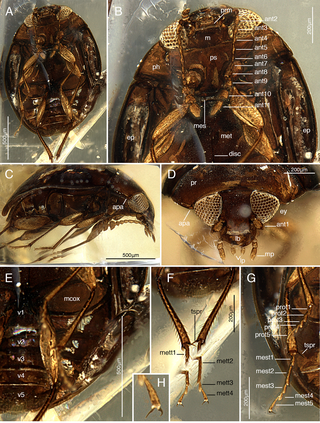
Cyclaxyridae are a family of beetles in the superfamily Cucujoidea. The only living genus is Cyclaxyra, with two species endemic to New Zealand. Other species have been named from fossils. They are also known as sooty mould beetles due to the association of Cyclaxyra with sooty mould. The extant species are mycophagous, feeding on spores, conidia, and hyphae.

Didymocantha is a genus of longhorn beetles.
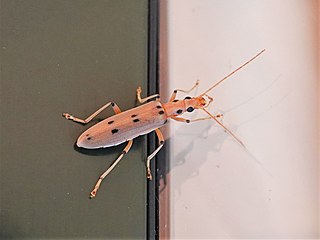
Parisopalpus is a genus of false blister beetles in the family Oedemeridae. The genus was first identified by Logan Hudson in 1975, who separated the group from Sessinia due to the presence of bifid mandibles, and n males of the species visible genitalia.

Migadopini is a tribe of ground beetles in the family Carabidae. There are about 16 genera and more than 40 described species in Migadopini.




















